|
By Donald H. Harrison
ANGELUS OAKS, Calif.— The international staff has begun
its training at Camp Mountain Chai in preparation for the June 27 opening of the
San Diego Jewish community's own sleepover camp for children between the ages of
third and eleventh grades.
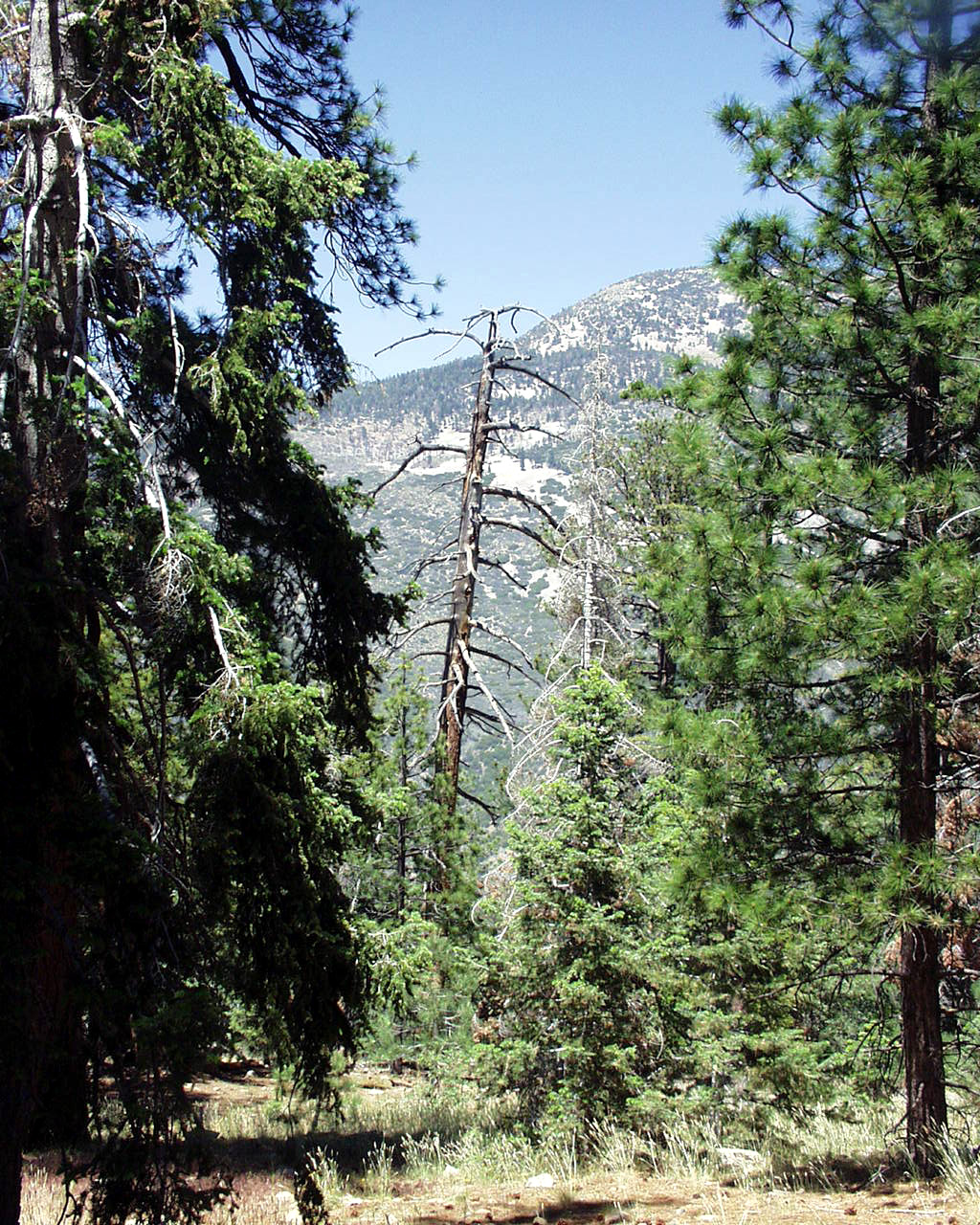 As
I toured the facility, located 130 miles and about 2 hours, 15 minutes driving
time northeast of the United Jewish Federation's headquarters in Kearny Mesa,
the counselors were practicing cardio-pulmonary resuscitation techniques;
teaching each other games from their countries that they, in turn, could teach
campers; and acclimating themselves to life at an altitude of 7,500 feet among
pines and snow-clad mountain vistas (yes, even in summer) in the San Bernardino
National Forest east of Redlands. It is in a little hamlet called Angelus
Oaks, in San Bernardino County, two counties north of San Diego. As
I toured the facility, located 130 miles and about 2 hours, 15 minutes driving
time northeast of the United Jewish Federation's headquarters in Kearny Mesa,
the counselors were practicing cardio-pulmonary resuscitation techniques;
teaching each other games from their countries that they, in turn, could teach
campers; and acclimating themselves to life at an altitude of 7,500 feet among
pines and snow-clad mountain vistas (yes, even in summer) in the San Bernardino
National Forest east of Redlands. It is in a little hamlet called Angelus
Oaks, in San Bernardino County, two counties north of San Diego.
As I observed with Ed Samiljan, a board member and treasurer of the camp, and
his Balboa Park-area neighbor, Arthur Dorf, who is sending his two
grandsons to camp to better acquaint them with the Jewish side of their mixed
Jewish and Catholic heritage, I couldn't help but smile remembering the
fun I had some 50 years ago when I attended sleep-away camps in the mountains of
New York and Massachusetts. The memories last that long!
Richard Farr, a counselor from Australia, gathered his colleagues into a circle
and asked them to guess whether the coin he was holding would land on its heads
and tails side. They should do so by placing their hands either on their
heads or on their, er, tails. They did, he flipped the coin, and all those
who had picked the wrong part of their anatomy were instructed to sit or squat
down in the circle. Another flip, another group sat down, until there was
but one counselor standing. "An oice brigh-ker," he explained,
which, of course, is Australian for "ice-breaker." It's the kind
of activity depending purely on chance, one which any camper can be the
"winner" regardless of physical prowess. Not a bad way for
choosing people to do this or that activity either.
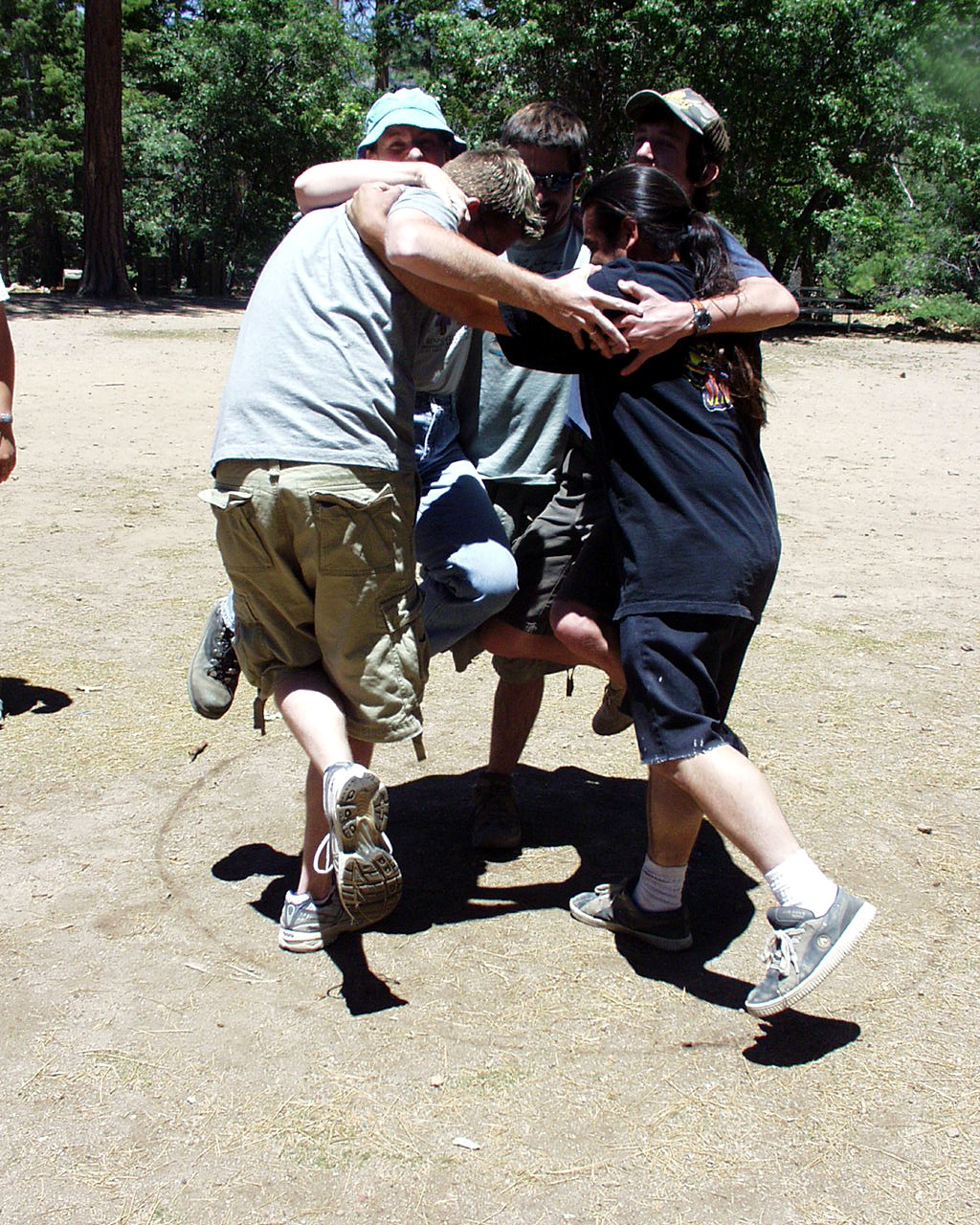 Next
Liron Lanciano, a counselor from Israel, took a stick and extending her
arms stiffly rotated her body, so that the stick traced the diameter of a circle
in the dirt. Then she put a group of five counselors in each circle.
There were 10 human feet in the circle, she said. To test the counselors'
ingenuity, she asked them to make it so there were only 8 feet in the
circle. That was easy, two counselors simply lifted one of their legs
behind them. Next, she wanted only 5 feet. Now all the counselors stood on
one leg, while keeping the other leg off the ground. But when the Israeli
called for only 4 legs to be in the circle, then 3, then 2, and finally just
one, the fun—and ingenuity—began. In some cases, counselors climbed on the
backs of others to avoid having their feet in the circle; in other cases they
stood on each other's feet. Whatever they did, it required team work. Next
Liron Lanciano, a counselor from Israel, took a stick and extending her
arms stiffly rotated her body, so that the stick traced the diameter of a circle
in the dirt. Then she put a group of five counselors in each circle.
There were 10 human feet in the circle, she said. To test the counselors'
ingenuity, she asked them to make it so there were only 8 feet in the
circle. That was easy, two counselors simply lifted one of their legs
behind them. Next, she wanted only 5 feet. Now all the counselors stood on
one leg, while keeping the other leg off the ground. But when the Israeli
called for only 4 legs to be in the circle, then 3, then 2, and finally just
one, the fun—and ingenuity—began. In some cases, counselors climbed on the
backs of others to avoid having their feet in the circle; in other cases they
stood on each other's feet. Whatever they did, it required team work.
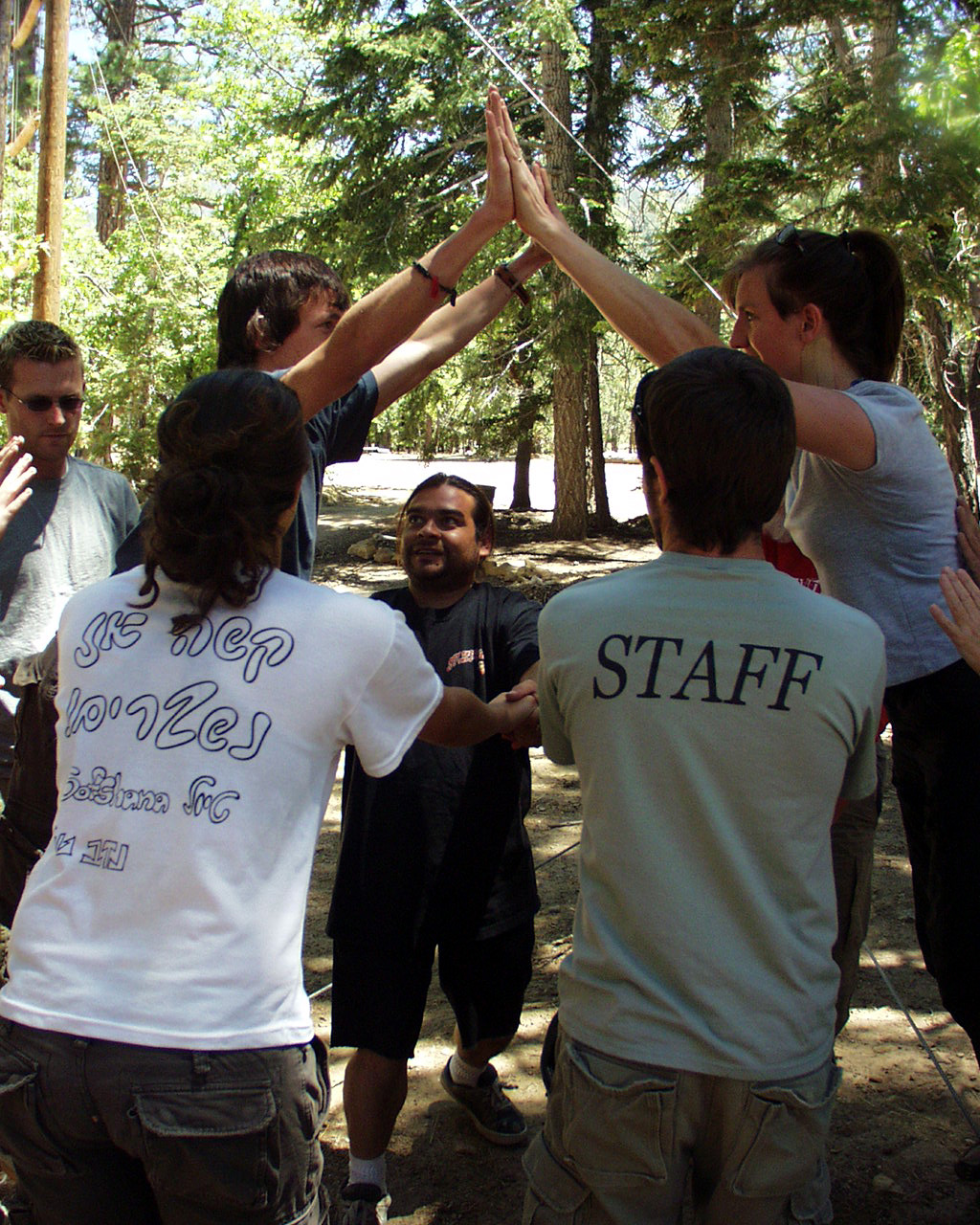 A
ropes course, which the counselors practiced, also demanded reliance on
partners. One of the courses involved two cables joined in a
V-shape. Two participants put their palms to each other's palms for
balance, then advanced together down the separate legs of the V, keeping their
balance by steadying themselves against each other. The other counselors,
meanwhile, surrounded them, encouraging them verbally while standing at
the ready to catch them should the participants fall. A
ropes course, which the counselors practiced, also demanded reliance on
partners. One of the courses involved two cables joined in a
V-shape. Two participants put their palms to each other's palms for
balance, then advanced together down the separate legs of the V, keeping their
balance by steadying themselves against each other. The other counselors,
meanwhile, surrounded them, encouraging them verbally while standing at
the ready to catch them should the participants fall.
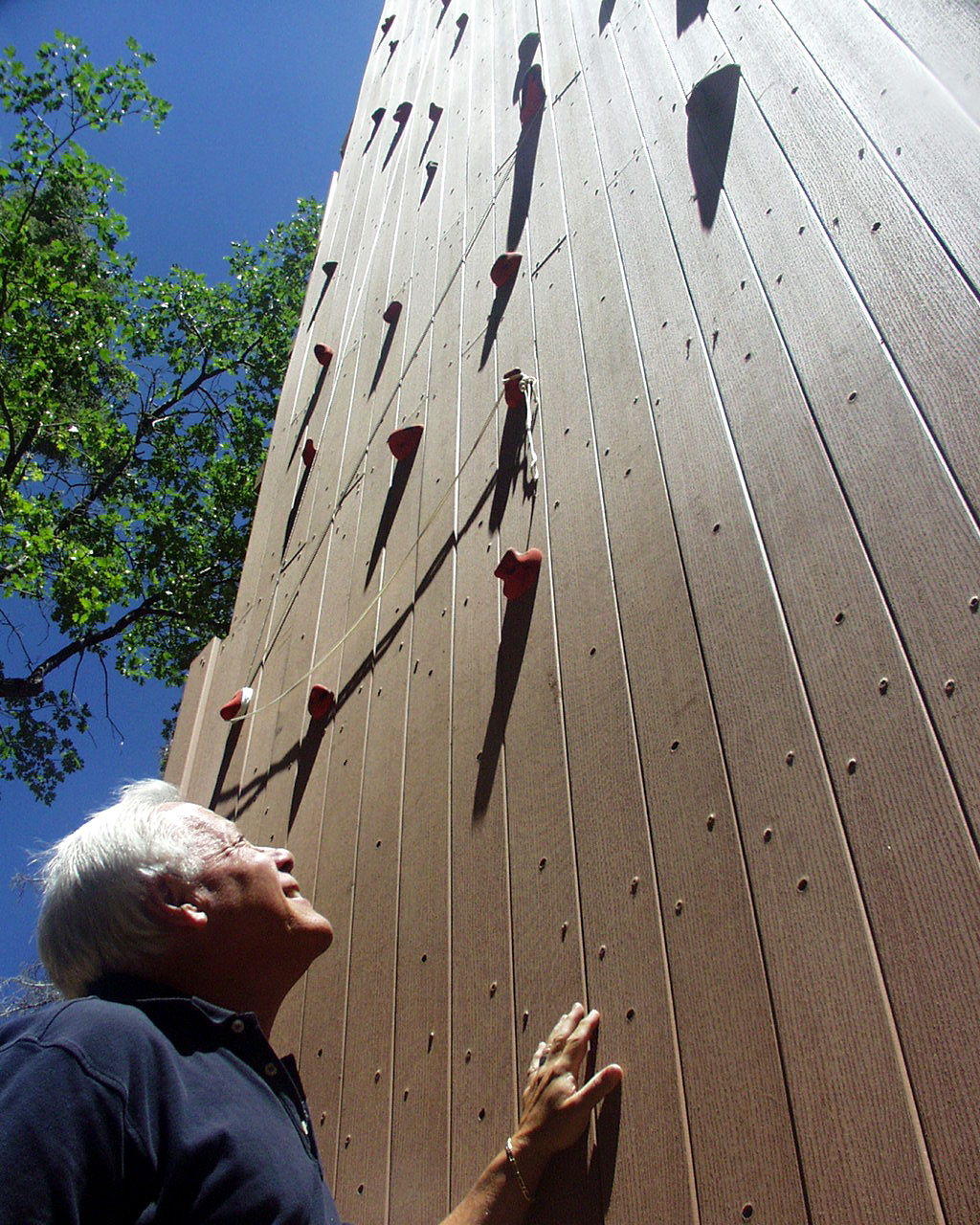 Besides
such games and other outdoor activities like horseback riding, trail bike
riding, canoeing in nearby Lake Jenks, swimming in the camp's large pool,
basketball, volleyball, nature study, scuba diving (at a special facility in
nearby Big Bear), and a newly installed 40-foot climbing wall, campers will also
participate in specifically Jewish activities such as Shabbat prayer, Israeli
dances, and Hebrew songs. Besides
such games and other outdoor activities like horseback riding, trail bike
riding, canoeing in nearby Lake Jenks, swimming in the camp's large pool,
basketball, volleyball, nature study, scuba diving (at a special facility in
nearby Big Bear), and a newly installed 40-foot climbing wall, campers will also
participate in specifically Jewish activities such as Shabbat prayer, Israeli
dances, and Hebrew songs.
"You know we are not a 'Hebrew school in the woods,' but we want to be a
place where kids learn to be more comfortable with their Jewish identity; with
better knowledge of their culture, their traditions, their heritage,"
commented Len Keilen, Camp Mountain Chai's executive
director.
Camp Director Len Keilen
"Unlike the 'movement' {such as Reform, Conservative, Orthodox} camps,
where the kids are homogenous religiously, we will have kids of all religious
backgrounds. So we want to stress the things that bring them together as
Jews; not the things that pull them apart as Jews. So we are going to
stress those things that we all have in common."
With more than a quarter-century experience running B'nai B'rith sleepover camps
in Wisconsin and Pennsylvania, Keilen knows about building enduring Jewish
memories. At an outdoor amphitheatre, where a Torah on loan from Congregation
Beth Israel will be the focus of attention, campers will assemble to welcome the
Shabbat with songs. Then, each week a different group of campers will conduct
the services.
"F ollowing the services
we will do a traditional Shabbat dinner," Keilen said. "We
will start with the blessings over the candles, the wine, the challah
and a tradition that I will bring here, which was an important part of my
camping career. Each week we will bring up a different group of kids and
we will do a blessing over the children. And it is interesting ,we had a
reunion at our old camp (in Starlight, Pennsylvania), and I had two people who
were in graduate school who came up to me and said 'would you do the blessing
over us on Friday night?' They remembered from the time when they were younger!"
All food at the camp is kosher, and a typical Shabbat evening dinner will
include "chicken or roast beef or turkey, challah, chicken soup,
potatoes, vegetables—the works," Keilen said. "Then we will spend
about an hour singing. We have a wonderful music instructor coming from
Israel, Chen Gusler, and he is outstanding. He plays the guitar, keyboard,
harmonica, anything you can give him, and the kids will love him—he is like
a big teddy bear—and he will be leading singing in the dining hall. You
will see kids standing up on their chairs, singing, the ruach (the
spirit) is a big thing that will make camp special.
"From there we will go to Israeli dancing. We have a big tent behind the
dining hall, and Tami (Tessler, from Omer, Israel) will be doing Israeli dance—that
will create the Friday night spirit.
"Saturday morning, again, we have services done by the kids, and we do
something special. Not all our kids can read Hebrew, and even those that can,
don't understand Hebrew, so we do an interpretation of the Torah portion in
English, using puppets. It is called, 'Saturday Torah Live.' Our
older campers and staff write the script and I call it Bill Cosby's
philosophy; 'they have fun, and if they are not careful they will learn
something' because in order to put on the puppet show they have to study
the parsha so they know what the puppet show should be about.
"So the older kids are learning a little bit of Torah, and the (younger)
kids love it, it is a favorite part of the service for them. It is done with
songs, and gags, and humor, but the kids walk away with an understanding of
what the portion is...."
Besides Shabbat, the camp will be suffused with other reminders of Jewish
culture. For example, the six lodge buildings on the 18-acre
site—which still is used the other three seasons of the year as a retreat
center—will be identified with their pre-existing English names, as well as
translations and transliterations of those names into Hebrew. Thus
campers will soon learn that coyote, deer, eagle, falcon, owl and wolf are
known in Hebrew respectively as ze'ev aravot, tzvi, aieet, baz, yanshuf, and
ze'ev.
During the summer, campers also will get to participate in a
Maccabiah competition—known as "color wars" at some camps—in
which the entire camp will be divided into the blue team and the white team
and will compete in a variety of activities. "There will be a
sports competition, singing competition, and they will create banners
and plaques, and it will be a real day of ruach for the kids,"
predicted Joanne Morgenthal, the camp's associate director who was a staff
member for seven years and an assistant director for a year at the B'nai
B'rith Perlman Camp in the Pocono Mountains on the Pennsylvania-New York
border before being hired away by Keilen.
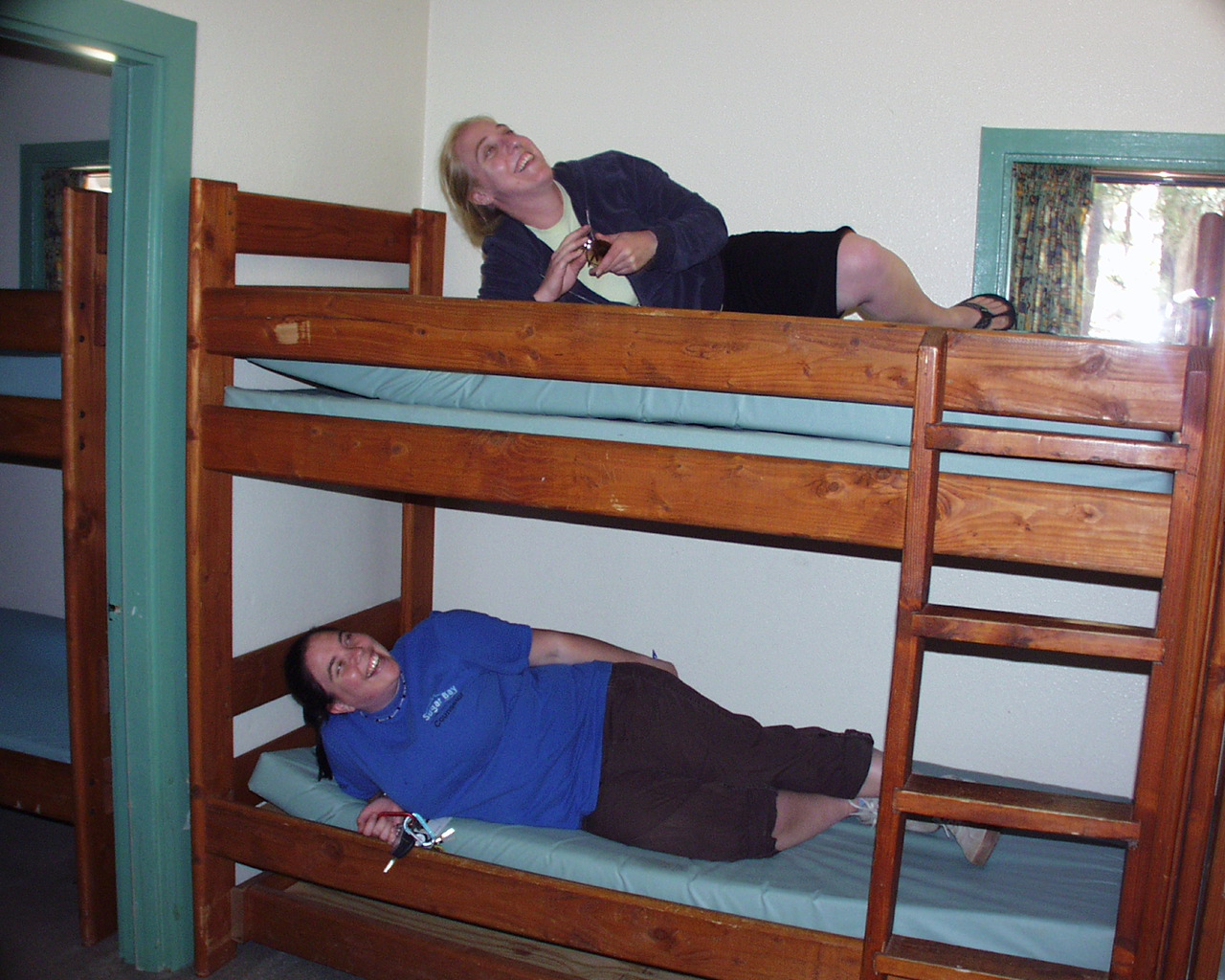 I
asked Morgenthal to describe a typical day in a camper's life, and was
surprised by just how busy the campers will be. I can imagine after a
day such as this everyone of them will sleep like logs in bunk beds that
Morgenthal and the camp's marketing director, Giya Pnematicatis (a South
African of Greek origin) personally tested. (Morgenthal took the top bunk.) I
asked Morgenthal to describe a typical day in a camper's life, and was
surprised by just how busy the campers will be. I can imagine after a
day such as this everyone of them will sleep like logs in bunk beds that
Morgenthal and the camp's marketing director, Giya Pnematicatis (a South
African of Greek origin) personally tested. (Morgenthal took the top bunk.)
"They wake up about 8 o'clock, and we will meet at our flagpole for a
morning ceremony at which we will raise both the American and the Israeli
flags," followed by a morning prayer, camp songs, and a joke of the day
before heading for breakfast. "After breakfast the kids will go back to
the cabins and clean the cabins with the staff, and then they will head out to
activities.
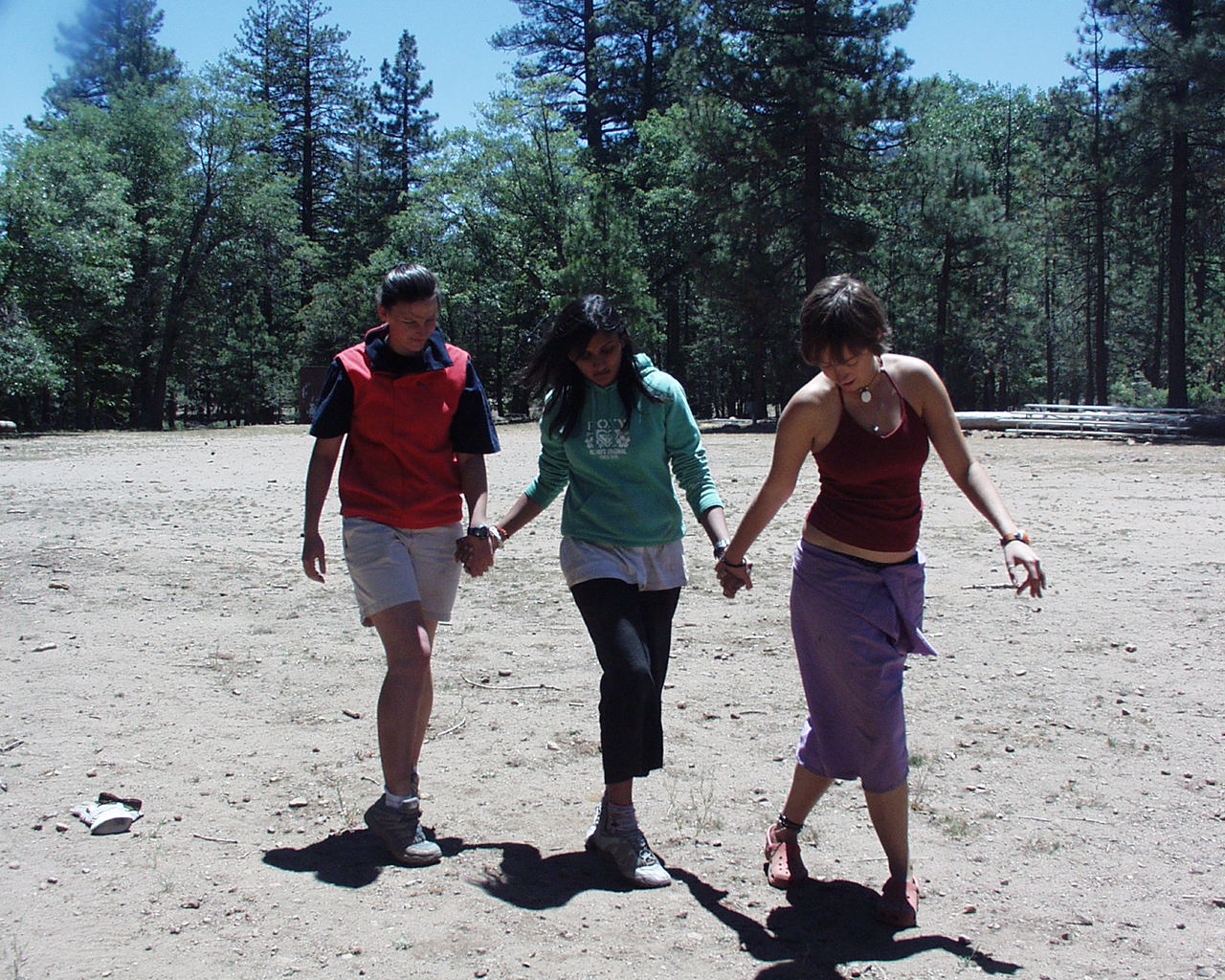 "Our
activities in the morning will be one elective activity, the kids can choose
one specific area that they really want to learn solid skills in and they will
do that every day for the entire week at that specific time, such as archery,
basketball, rock climbing, ceramics, drama, singing, Israeli dancing, and a
wide range of other activities here at Camp Mountain Chai," Morgenthal
said. "Our
activities in the morning will be one elective activity, the kids can choose
one specific area that they really want to learn solid skills in and they will
do that every day for the entire week at that specific time, such as archery,
basketball, rock climbing, ceramics, drama, singing, Israeli dancing, and a
wide range of other activities here at Camp Mountain Chai," Morgenthal
said.
"Then, after their first elective, the kids will have a bunk activity
where the kids will come together with the other kids from their cabins, and
they will go out to an activity whether it be canoeing, rock climbing,
mountain biking, arts and crafts, drama again, and then we will all
get
Tami Tessler of Omer, Israel, right, shows
dance steps to
Hannah Wenke of Sydney, Australia, and Dina Patel of
Bornmouth, England—all Camp Mountain Chai staffers.
together for lunch. After lunch the kids will have a little bit of down time
to rest, a 45-minute rest period, and then we go right back into our
three periods of the afternoon, one of which is an elective... and the other
two periods are cabin times (in which) with their groups of the same
age, they will go to the lake, or go to the pool, or ... the ropes
course, that sort of thing....
"We then have about a 45-minute shower time for the kids; they go back to
the cabin and get ready for dinner. We have dinner, and after dinner
there is a general activity time, in which camp is open for the kids — we
place our counselors all around the camp for supervision and the kids can go
and participate in whatever they want to do.
"If they want to grab a ball and play basketball, if they just want to
sit by the pool, or sit by a tree, that is fine too. And then we will
have our evening activity— the whole camp will get together and we
will do different activities on different nights. One night may be a campfire,
another night a talent show, we will do a night where the cabins prepare lip
sync to a song, and they get up and perform it in front of the rest of the
group. We do a night where the counselors are doing silly funny
races, that the campers get to laugh at them for...."
Commenting on the programming, Keilen said, "we try to
find a balance. If you look at some camps on the internet, you will
see some camps are all specialty camps, where first thing after breakfast
they do specialties all day, while other camps are all cabin-group-oriented.
We want to give kids an opportunity to do the things they want to do, but we
also know from experience that the magic of camp when we talk about 'community.'
is bonding with the kids in your cabin." The schedule therefore
includes some "elective" or "specialty" activities, and
some general activities which they enjoy with their cabin-mates.
Besides Israelis, Australians, and Americans, the camp staff includes
counselors from South Africa and England. Not all these counselors are
Jewish, but all will learn and participate in the Jewish activities.
According to Keilen, the benefits of an international staff run in two
directions: the campers get to meet people from other interesting
backgrounds while, at the same time, the counselors receive positive
exposure to the Jewish world.
* * *
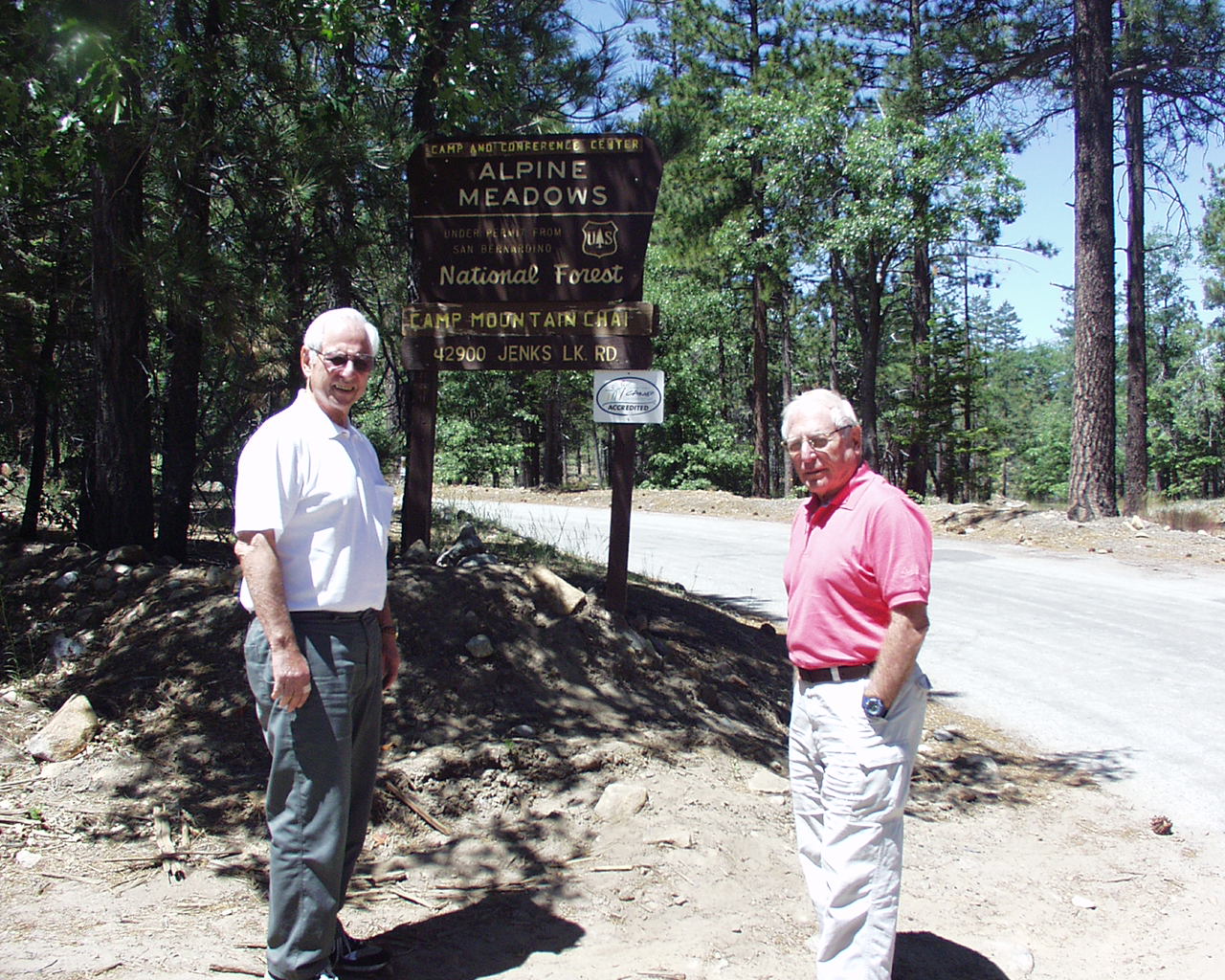 When
the camp opens June 27, it will be the end of the long chapter of
preparations and the beginning of the new chapter of realization. It has
been approximately six years since the time a committee of the United Jewish
Federation of San Diego County decided to authorize a needs assessment to
see whether members of the Jewish community thought a sleep-over camp was
necessary. When
the camp opens June 27, it will be the end of the long chapter of
preparations and the beginning of the new chapter of realization. It has
been approximately six years since the time a committee of the United Jewish
Federation of San Diego County decided to authorize a needs assessment to
see whether members of the Jewish community thought a sleep-over camp was
necessary.
As a result of the assessment, a more formal feasibility study was
undertaken, again with positive results. Samiljan, today the
treasurer, joined with such community leaders as Murray and Elaine
Galinson,
Todd Kobernick
and Dr. Jack Bark in forming a
Ed Samiljan, left, and Arthur Dorf at camp entrance
separate non-profit organization to run Camp Mountain Chai, whose name was suggested by Oscar
Worm in a contest run in the now defunct San Diego Jewish Press-Heritage and
judged by the Galinsons. Elaine Galinson today chairs the camp's
board, while Kobernick serves as the president.
Initially, the organizers announced that the camp would be located on a
property in Idyllwild, California, somewhat closer to San Diego County, but
after spending $150,000 for site testing and the like, the organizers
determined that property did not have sufficient water service to support
250 campers and an additional complement of staff members.
Driving up to the camp, Samiljan remembered that as a dark period, in which
financial backers of the camp, who in the aggregate have to date pledged $6
million for its success were asked, in light of the news, whether they
wanted to abandon the project and cancel the balance of their unused
pledges. The backers responded that to the contrary, the need for the
camp still existed, especially in light of studies that indicate that there
are three strong paths to insuring that a child will maintain his or her
Jewish identity—Jewish day school, trips to Israel, and Jewish summer
camp.
The camp's organizers put out word with the American Camping Association and
with other camps that they were looking for a site, and eventually they were
contacted about the availability of the Alpine Meadows Conference Center,
which previously had housed a program for troubled youth. The owner
had spent millions of dollars adapting the camp to year-round weather
conditions, which includes snow in the winter.
In deciding to purchase the camp/ conference center, the board realized that
it could serve the Jewish community not only as a summer camp for children,
but also as a retreat center during the year for various Jewish
congregations and organizations of San Diego. Numerous synagogues have
held events at the camp since it was dedicated on Sept. 14, 2005, in
ceremonies at the amphitheatre that in the future will double during summers
as an outdoor synagogue.
At the same time, the camp has been able to retain as customers many of the
non-Jewish organizations that had used the Alpine Meadows Conference Center
under the old management during the off-season. These include some Orange
County schools, and various church and civic groups, said Samiljan. As
kosher food has been made the exclusive meal service in the camp, groups
that are using the conference center in the off-season are complying with
the rules of kashrut, for them an interesting cross-cultural
experience.
Samiljan said that Jewish camps typically have to be subsidized from other
sources, and he is hoping that by building up the off-season retreat
business the camp will be self-sufficient.
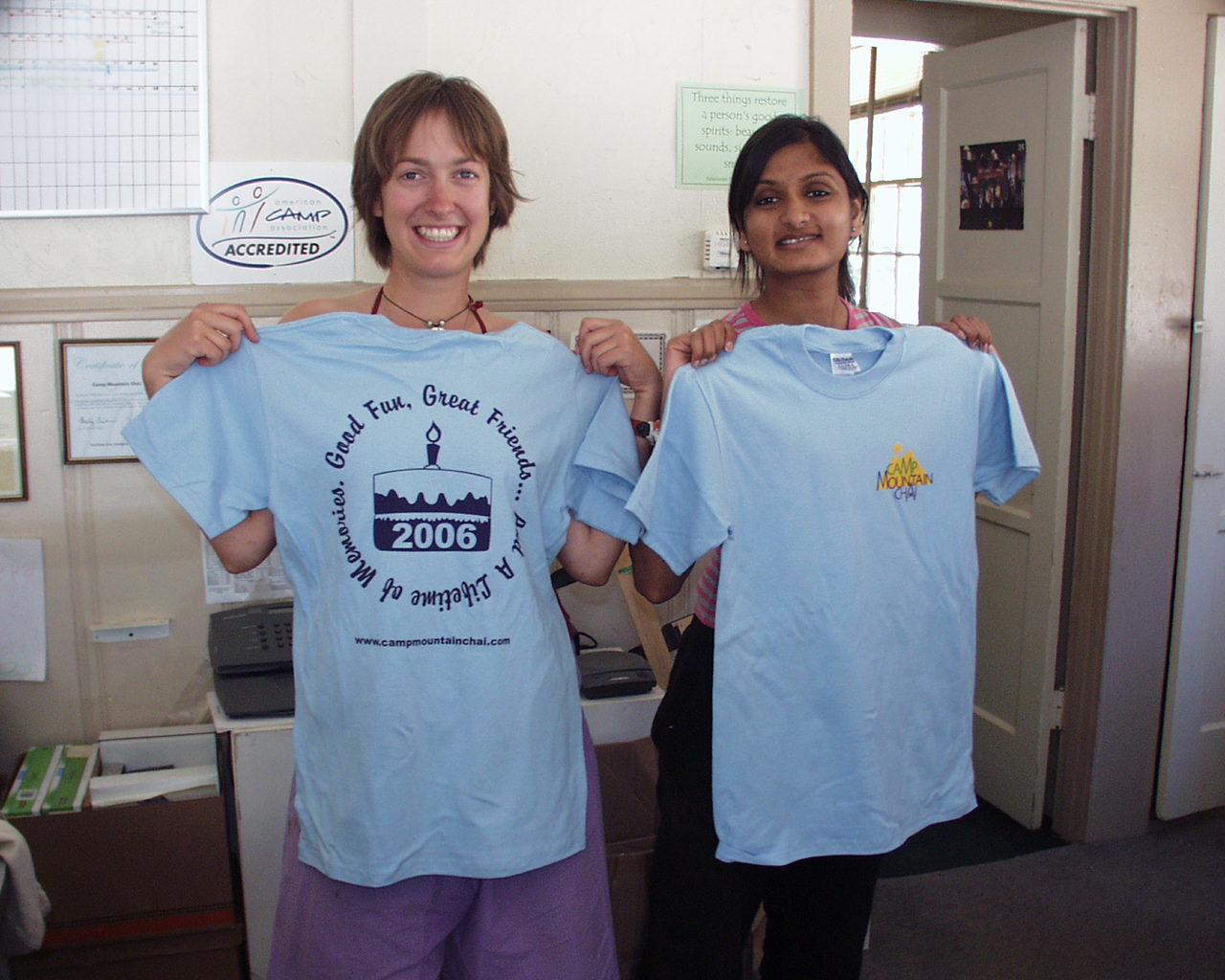 The
fee for a two-week session of camp, the minimum time period, is $1,700
without scholarship. Camping can be extended over a longer period at
approximately $850 a week, according to Samiljan. A variety of
scholarship funds have been set up for students, based on financial need, he
said. He said the board of directors—taking a cue from the popular
"Operation Birthright" program which guarantees every Jewish child
a trip to Israel—has agreed to create a "Campright" program
which stipulates that no child ever will be turned away on the grounds that
his or her family cannot afford to pay. The
fee for a two-week session of camp, the minimum time period, is $1,700
without scholarship. Camping can be extended over a longer period at
approximately $850 a week, according to Samiljan. A variety of
scholarship funds have been set up for students, based on financial need, he
said. He said the board of directors—taking a cue from the popular
"Operation Birthright" program which guarantees every Jewish child
a trip to Israel—has agreed to create a "Campright" program
which stipulates that no child ever will be turned away on the grounds that
his or her family cannot afford to pay.
This means that if parents or guardians meet confidentially with a committee
of the board and a finding of financial need is made, a camper will be
admitted to the camp "for a very nominal sum."
Samiljan said a surprise of West Coast camping has been that some families
wait until the last minute to decide whether to send their children to
camp—instead of booking a year in advance as is done at some East Coast
camps. The first year enrollment thus far is 115 campers, and Samiljan
hopes that a few more might yet be added to the rolls before the June 27
start up. He is confident the camp will enroll its full
complement—250 campers—in the summer of 2007.
Information on the camp is available at its website, www.campmountainchai.com
or by calling its administrative center at the Lawrence Family Jewish
Community Center in La Jolla at (858) 535-1995 or the camp offices in
Angelus Oaks at (909) 794-3800.
|

